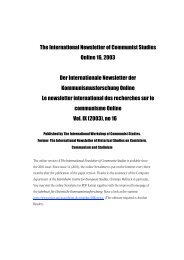VOL. XVI (2010), NO 23 - The International Newsletter of Communist ...
VOL. XVI (2010), NO 23 - The International Newsletter of Communist ...
VOL. XVI (2010), NO 23 - The International Newsletter of Communist ...
Sie wollen auch ein ePaper? Erhöhen Sie die Reichweite Ihrer Titel.
YUMPU macht aus Druck-PDFs automatisch weboptimierte ePaper, die Google liebt.
<strong>The</strong> <strong>International</strong> <strong>Newsletter</strong> <strong>of</strong> <strong>Communist</strong> Studies Online <strong>XVI</strong> (<strong>2010</strong>), no. <strong>23</strong> 45<br />
Germany’s unification the venture had been taken over by West German companies and was<br />
finally completed in 1993. 12<br />
Research Design<br />
Since the mid 1990s former pipeline workers have regularly met in small private circles. In<br />
September 1997, the core <strong>of</strong> that initial group founded the first <strong>of</strong>ficially registered<br />
association, a few years later a second association was registered. 13 Today, a vivid culture<br />
<strong>of</strong> remembrance exists among former pipeline workers. Memory <strong>of</strong> the pipeline construction<br />
does not remain on a private oral level. Instead, it is kept alive by Trassenvereine whose<br />
members organise reunions, maintain web pages, provide a discussion forum and run a<br />
small museum. Moreover, a few pipeline workers have published memoirs and one <strong>of</strong> them<br />
co-directed a documentary film. Last but not least, the historical event is mentioned on<br />
numerous web pages, including Wikipedia and YouTube.<br />
<strong>The</strong> community <strong>of</strong> former pipeline workers sets itself apart from an “out-group” 14 by strong<br />
reference to a shared biographical event. For many former pipeline employees, their period<br />
<strong>of</strong> life and work in the former Soviet Union represents one <strong>of</strong> the key points <strong>of</strong> their lives, and<br />
thus still connects them to other people who share the same life experience.<br />
Combining biographical approaches with the perspective <strong>of</strong> the ethnography <strong>of</strong><br />
communication, this project traces the contexts and linguistic devices that constitute the<br />
“network specific discourse conventions” 15 within the process <strong>of</strong> community building since<br />
the 1990s until today.<br />
<strong>The</strong> data corpus comprises <strong>of</strong> biographical narrative interviews, web pages, internet forums<br />
that have been maintained since the year 2000, participant observations and informal<br />
conversations at reunions as well as telephone conversations. <strong>The</strong> study heavily relies on<br />
“natural data”, i.e. data that were generated without the influence <strong>of</strong> a researcher, for<br />
example web pages and Internet forums. With regard to the history <strong>of</strong> the associations since<br />
the mid 1990s it can be safely said that the increasing spread <strong>of</strong> internet access has had a<br />
significant impact on the emergence <strong>of</strong> the community. Only by means <strong>of</strong> the World Wide<br />
Web and by establishing corresponding communicative strategies have former pipeline<br />
builders been able to bridge geographical distances between a range <strong>of</strong> different places <strong>of</strong><br />
residence. Moreover, and perhaps more importantly, the occupation <strong>of</strong> virtual spaces has<br />
enabled former pipeline workers to reclaim publicity. Former pipeline employees notably<br />
struggle with an immense loss <strong>of</strong> prestige that they once enjoyed on an ideological as well as<br />
on a material level. Likewise, "many marginalized groups <strong>of</strong> identity formation have been reappropriating<br />
the technological spaces <strong>of</strong> expression such as […] the internet to disseminate<br />
their own knowledge and specificities" 16 .<br />
12 In fact, the West German energy company Ruhrgas AG, known as Eon Ruhrgas today, had signed a contract as<br />
early as 1970 with the Soviet state, according to which the company delivered the pipes for the venture and<br />
obtained gas in exchange.<br />
13 <strong>The</strong> splitting up <strong>of</strong> the community into two associations reflects the structure <strong>of</strong> the economic event. <strong>The</strong><br />
association Erdgastrasse e.V. targets former employees <strong>of</strong> the state owned companies that were in charge <strong>of</strong> the<br />
implementation <strong>of</strong> the affiliated duties <strong>of</strong> the venture, i.e. the development <strong>of</strong> the general infrastructure and dwelling<br />
places along the pipeline. <strong>The</strong> association Erdgastrasse-LT e.V. addresses to former employees <strong>of</strong> those<br />
companies that were in charge for the construction <strong>of</strong> the pipeline as such.<br />
14 John J. Gumperz: Discourse Strategies, Cambridge, Cambridge Univ. Press, 1988, p. 45.<br />
15 Ibid., p. 42.<br />
16 Boulou E. de B’béri: <strong>The</strong> New Practices <strong>of</strong> Memory. <strong>The</strong> Case <strong>of</strong> Atanarjuat and Indigenous Peoples Council <strong>of</strong><br />
Biocolonialism, URL http://mokk.bme.hu/centre/conferences/reactivism/submissions/ebanda. [last consulted:<br />
01.04.2009].














